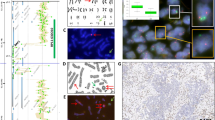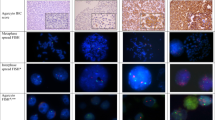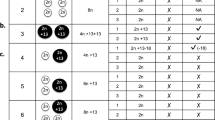Abstract
Investigation of transitional cell carcinoma of the urinary bladder (TCC) patients classified by recurrence and/or progression has demonstrated that loss of chromosome 9, as detected by FISH analysis of the pericentromeric classical satellite marker at 9q12, occurs early. A total of 105 TCCs from 53 patients were analysed in situ by two independent observers for loss of chromosome 9 using quantitative fluorescence in situ hybridization (FISH). All 53 primary tumours were evaluated for chromosomes 9, 7 and 17. Normal ranges for chromosomal copy number were defined for normal skin epidermis and bladder epithelium. Values for chromosome 9 copy number outwith the range 1.51-2.10 (mean +/- 3 x s.d. of normal values) were significantly abnormal. Twenty-five TCCs were detected with consistent monosomic scores. Of 89 TCCs, in which multiple tumour areas were analysed, 85 tumours (96%) demonstrated the same chromosome 9 copy number in all areas (2-6) analysed; only three tumours demonstrated heterogeneity for this locus. A total of 36% (12 out of 33) of patients with subsequent disease recurrence demonstrated loss of chromosome 9 in their primary and all subsequent TCCs analysed. Only a single patient (n = 20) with non-recurrent TCC showed loss of chromosome 9 (P = 0.0085). Of 53 primary tumours, eight showed significant elevation of chromosome 17. Of these patients, six demonstrated elevation in chromosome 7 copy number. No abnormalities were observed in non-recurrent patients. This study describes rapid quantitation of chromosomal copy number by FISH using a pericentromeric probe for chromosome 9 in TCC of the urinary bladder. Routinely fixed and processed material was evaluated without disaggregation. Strict quality control of FISH demonstrated that this technique was reproducible in a clinical environment and could be used to detect genetic changes relevant to patient outcome. It is proposed that loss of chromosome 9 from primary TCC of the urinary bladder identified patients at high risk of recurrence and possible progression.
This is a preview of subscription content, access via your institution
Access options
Subscribe to this journal
Receive 24 print issues and online access
$259.00 per year
only $10.79 per issue
Buy this article
- Purchase on Springer Link
- Instant access to full article PDF
Prices may be subject to local taxes which are calculated during checkout
Similar content being viewed by others
Author information
Authors and Affiliations
Rights and permissions
About this article
Cite this article
Bartlett, J., Watters, A., Ballantyne, S. et al. Is chromosome 9 loss a marker of disease recurrence in transitional cell carcinoma of the urinary bladder?. Br J Cancer 77, 2193–2198 (1998). https://doi.org/10.1038/bjc.1998.365
Issue Date:
DOI: https://doi.org/10.1038/bjc.1998.365
This article is cited by
-
HER2/neu overexpression in the development of muscle-invasive transitional cell carcinoma of the bladder
British Journal of Cancer (2003)
-
Genetic aberrations of c-myc and CCND1 in the development of invasive bladder cancer
British Journal of Cancer (2002)
-
Chromosome 9 deletions and recurrence of superficial bladder cancer: identification of four regions of prognostic interest
Oncogene (2000)



